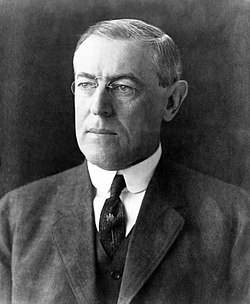Fourteen points
The Fourteen Points were a series of proposals made on January 8, 1918 by US President Woodrow Wilson in a speech addressed to the United States Congress, in order to create new objectives morally defensible warfare for the Triple Entente and that could serve as the basis for peace negotiations with the Central Powers at the end of the First World War. However, his main allies (Georges Clemenceau of France, David Lloyd George of the United Kingdom, and Vittorio Orlando of Italy) were skeptical about the applicability of Wilsonian idealism.
Context
Toward the end of the Great War, on January 8, 1918, United States President Woodrow Wilson called on the warring European nations to cease fire and make way for the rebuilding of the continent.
For this, he drafted a speech known as the “Fourteen Points”, which was nothing more than a series of proposals that would allow the specter of war to vanish throughout the planet and the formation of a new world order. The speech was given on January 8, 1918 before the United States Congress. The president's intention was to present war objectives for the Entente that would allow peace to be achieved and counteract the Bolshevik pacifist propaganda; Trotsky's proposal to negotiate an immediate peace had been rejected by the Entente shortly before, and the Entente wished to avoid with his own proposal the adverse effect of having refused to negotiate peace while the Central Powers had accepted.
The president based his proposals contained in the Points on the suggestions presented in a report of the informal meeting of the United States Congress in charge of preparing the future peace conference a few days before.
Wilson's Fourteen Points
These points are:
- Open conventions and not secret diplomacy in the future.
- Freedom of navigation in peace and war outside the jurisdictional waters, except when the seas were closed by an international agreement.
- Disappearance, as much as possible, of economic barriers.
- Adequate safeguards for the reduction of national armaments.
- Rejustment of colonial claims, so that the interests of peoples deserve equal consideration than the aspirations of Governments, whose basis will be determined.
- Evacuation of all Russian territory, giving Russia full opportunity for its own development with the help of the powers.
- Full restoration of Belgium in its complete and free sovereignty.
- Release of all French territory and reparation for the damages caused by Prussia in 1871.
- Adjustment of the Italian borders according to the principle of nationality.
- Opportunity for the autonomous development of the peoples of the Austro-Hungarian Empire.
- Evacuation of Romania, Serbia and Montenegro, granting access to the sea to Serbia and settlement of relations between Balkan States in accordance with their feelings and the principle of nationality.
- Security of autonomous development of the non-Turkish nationalities of the Ottoman Empire, and the Strait of the Dardanelos free for all kinds of ships.
- Declaring Poland as an independent state, which also has access to the sea.
- The creation of a general association of nations, to be constituted by specific covenants with a view to ensuring the political independence and territorial integrity of both large and small States.
From this last point came the initiative for the formation of the League of Nations, antecedent of the United Nations.
Contenido relacionado
Valdivia
Annex: Athletics at the 1924 Paris Olympics
Andrea Bonaiuto

